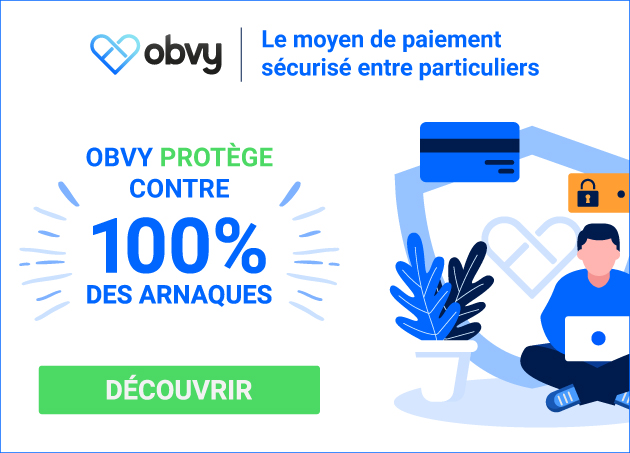Avoid the PCS Mastercard (or Transcash, Tonéo...) scam on classified ad sites
Originally very common on dating sites, this scam aimed to establish an emotional or romantic bond with a victim and then ask them to help them deal with a false problem by sending them PCS top-ups, sometimes called "coupons". Little by little, this scam has spread to classified ad sites such as Leboncoin, Paru Vendu and Vivastreet. Very popular, it is claiming many victims.
Find out how to protect yourself in less than 3 minutes by watching our video on payment coupon scams:
Want to find out more? Read the full article below
The success of this scam lies in its simplicity: no account to open, no website to register on, all the victim has to do is go to a tobacconist's to buy a PCS Mastercard, Transcash or Tonéo top-up... Then the scammer will ask them to give the "RECH code" printed on the top-up, which takes the form of a till receipt (RECH stands for recharge, enabling the scammer to credit the card anonymously and in a matter of seconds, and so take the money). The fact that they are impossible to trace and that they guarantee anonymity are also arguments that make them one of the most popular scams with crooks.
A bargain masquerading as a scam
This is nothing new, not even for you if you've read our other articles, such as the one on the Western Union scam. It all starts with a very attractive golden deal posted by the scammer and aimed at attracting as many potential buyers as possible to be swindled. To find out more about ads to be wary of, we've written an article on how to spot a fake ad or fake buyer's text message.
As usual, the alleged seller will only want to deal by email, will invoke a handicap or telephone or SMS problems to justify this choice, and will try to put pressure on you to complete the transaction as quickly as possible. To do this, they will invoke a family or personal tragedy to force them to settle the deal as quickly as possible, and will let you know that other so-called buyers who are very interested are also on the case. Needless to say, this is completely false.
The perfect way to defraud
As mentioned above, this type of payment raises fewer suspicions, as there is (initially) no need to register on a website, make an online payment or enter a whole host of information and codes. You simply go to the first tobacco shop nearby, buy a PCS refill, and you're done. All you have to do is go to the nearest tobacconist, buy a PCS refill, and you're done. The fact that the refill is purchased in a nearby physical location removes some of the buyer's fears. Scammers are notoriously manipulative, so it's always a good idea to keep a good distance when dealing with strangers.
Once the top-up has been purchased, there are several possible scenarios:
Payment before delivery or dispatch
This is the basic and most classic technique. The scammer will play on your trust by asking you for the PCS code before sending you the item. Of course, you will never receive anything, and if he has arranged to meet you at a physical location for the delivery, there will of course be no-one waiting for you.
Checking the validity of the code
More subtle, this technique involves asking the buyer to enter their PCS code on a website to prove its validity. The scammer will say that he is simply protecting himself and is asking for proof that the code is valid. But in reality, this is a fake verification website. You should know that there is no such thing as a PCS code verification site, none whatsoever! When the buyer enters the code, it is sent directly to the scammer, who simply uses it to collect the money.
Register now on Obvy and get £5 free with the code STOPARNAQUE
Blocking payment
The scammer will ask the buyer to enter the codes on a platform that is supposed to keep the funds safe while the purchase is being made. These sites are actually interfaces created by the scammers, and do not keep the money but transmit the codes to the scammers, who then use them to take the funds as simply as possible.
Combined with other scams
Beware, some scams between individuals can use different scams simultaneously. For example, a so-called PayPal payment may also involve PCS Mastercard, Transcash or Tonéo top-ups, etc. The fake PayPal email sent by the scammer asks the buyer to enter their RECH codes on a fake PayPal interface, which claims to hold the money for the duration of the transaction. For one thing, PayPal does not hold money, as we explain in this article on the PayPal scam between individuals, and for another, PayPal never asks for additional funds using this type of payment method.
In any case, never pay a stranger with a PCS top-up for a transaction between private individuals (or for any other transaction for that matter)!
Choose the right payment method for these transactions
Most payment methods are not suitable for secure transactions between private individuals. Obvy is the only universal payment method specially designed for purchases and sales between private individuals. Our solution protects both the seller and the buyer from 100% of scams, and allows you to take advantage of exclusive features that are perfectly designed for this very special type of transaction.
It should also be noted that Neosurf has formed a partnership with Obvy to prevent these scams. For the first time, you can now pay securely for your purchases between private individuals using payment vouchers. We invite you to visit the page dedicated to the partnership between Obvy and Neosurf on their website.

